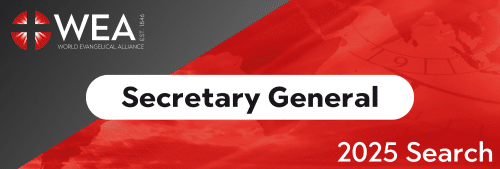This statement represents the World Evangelical Alliance’s (WEA) official response to an open letter dated December 1, 2017 (released on December 6) by the national Evangelical Alliances (EAs) of Italy, Spain, and Malta, expressing concern about an alleged “ecumenical agenda” of the WEA. We have delayed releasing this response as WEA Secretary General Bishop Efraim Tendero initiated meetings with the EAs of Italy (on December 13) and of Spain (on December 16) and had extensive follow-up correspondence with representatives of both EAs. Although we have not resolved our disagreements, we have achieved greater understanding through this interaction.
A more detailed analysis of issues related to the open letter is available to national EA leaders on request.
The open letter claims that “the ecumenical agenda away from WEA’s historic position on unity [with other Christian bodies] is about to reach a tipping point” and that the “WEA is about to sign a statement with the WCC [World Council of Churches] and the Roman Catholic Church on unity.”
These are serious charges, but they bear no resemblance to what the WEA is actually doing.
The primary accusation on which the open letter’s argument is based apparently resulted from the authors’ misinterpretation of reports from two separate meetings of the Global Christian Forum (GCF), a platform for sharing and discussion in which the WEA has participated for the past 20 years.
The authors of the open letter read a WCC description of a Global Christian Forum (GCF) planning meeting in Bossey, Switzerland that referred to the participants' general desire for “greater oneness” as Christians. They also read a description of a GCF meeting in Accra, Ghana on proselytism, which referred to the possibility that GCF participants may sign a “common statement” of understanding on that specific topic (i.e., proselytism). They then apparently conflated the two reports from two different meetings and drew the conclusion that the WEA was planning to sign a common statement on unity with the WCC and the Vatican.
We regret that the alliances that produced the open letter did not check their facts with us before publishing. However, we recognize that beneath this specific misunderstanding lies a deep-seated, ongoing concern about the WEA’s intra-faith relations and particularly its relationship with the Roman Catholic Church (RCC). The EAs responsible for the open letter fear that too close a rapprochement and collaboration with the Catholic Church could undermine our ability to articulate the historic evangelical faith in an uncompromised way.
The WEA has worked closely with Pope Francis and the Vatican on many issues, such as responses to the worldwide persecution of Christians. We do not believe that we have changed, betrayed, or compromised the WEA’s theological principles in doing so. However, we acknowledge the deep concerns expressed by these and other evangelicals from Catholic-majority countries.
As the recently published report of a 2009-2016 consultation involving WEA and RCC representatives clearly shows, wide differences remain between evangelicals and Catholics on numerous issues. (Representatives of the Italian and Spanish EAs participated in this consultation and half of the WEA’s delegation came from Catholic-majority countries.) The WEA’s relations with the Vatican do not ignore these differences and do not seek ecclesial or sacramental unity.
We recognize that evangelical-Catholic relations are a highly sensitive issue for evangelicals in many parts of the world, especially those with majority Catholic populations. We know that our evangelical brothers and sisters in Italy, Spain, Malta, and elsewhere have had difficult and at times painful experiences in their interactions with the RCC. These realities are not overlooked in our ongoing discussions with the Vatican.
We also acknowledge legitimate disagreement among evangelicals on how to approach the RCC today. Some evangelicals emphasize evidence of great positive change in the RCC over the last 50 years; others emphasize that Catholic documents and theological statements to which evangelicals strongly object, dating back to the Council of Trent in the mid-1500s, have not been repudiated. This is a very complex issue requiring careful discernment, and we respect the existence of a wide variety of opinions on this issue among evangelicals.
Although the WEA actively consults with its membership on matters of intra-faith and inter-faith relations, we recognize a need to be more proactive in communicating with our constituency about our activities. We have described our involvement in evangelical-Catholic dialogue in various forums and publications, but not in a formal manner to all national evangelical alliances. We will endeavor to provide more extensive detail on the scope and substance of our work with the Vatican and in intra-faith and inter-faith relations generally. In the meantime, those wishing to learn more about the WEA’s interactions with the Vatican and the GCF can consult the following documents:
WEA Supports the Future of the Global Christian Forum – WEA article on Global Christian Forum meeting in Bossey, Switzerland (Oct 2, 2017)
Global Consultation Discusses Issues Concerning the Church’s ‘Call to Mission and Perceptions of Proselytism’ – Bonn Profiles release on Global Christian Forum consultation in Accra, Ghana (Sept 18, 2017)
Collaboration without Compromise: The World Evangelical Alliance and Roman Catholic Leaders – An article by Thomas Schirrmacher and Thomas K. Johnson published by the World Reformed Fellowship (Aug 26, 2017)
Historic Gathering of Global Christian Leaders Urges Churches and Governments to Address Growing Concern for Persecution of Christians – WEA media release on Global Christian Forum consultation in Tirana, Albania (Nov 13, 2015) (see also Full Tirana Consultation Message)





Stay Connected